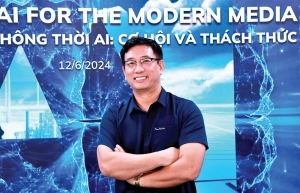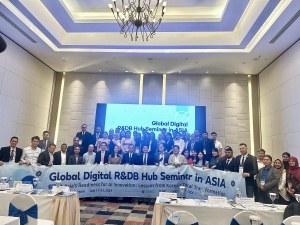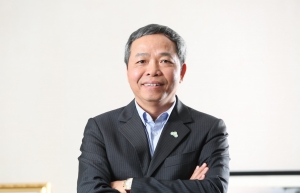Domestic tech giants join AI proliferation
 |
| Domestic tech giants join AI proliferation |
Nguyen Trung Chinh, chairman of the Board at CMC Corporation, and his staff are making preparations for the official announcement of AI transformation strategy in September, marking the next stage in the company’s future development.
He told VIR, “We are aware that AI is a fundamental driver of sustainable growth and innovation among businesses. Our strategy begins with fostering an AI transformation culture internally, nurturing a modern work environment within the company, and training a high-quality workforce capable of adopting and applying AI technology in daily operations.”
In 2017, CMC launched its digital transformation strategy, and has made great achievements. It is now the second-largest ICT corporation in Vietnam with around 10 member units, and has a presence in over 30 countries and continents.
Today, CMC operates at a global scale, with revenues and corporate value estimated at around $400 million. The group also owns more than 20 core technologies.
With AI transformation, the corporation aims to become a global digital corporation with a scale of billions of US dollars and a workforce of up to 15,000 employees.
Meanwhile, the biggest players in the local technology market are not an exception in these types of developments. Viettel entered the next phase of its development in 2023 when it renamed the Viettel Cyberspace Centre the Viettel AI and Data Services Centre, with a vision of becoming the top AI company in the Asia-Pacific region by 2030.
Nguyen Manh Quy, director of Viettel AI, said, “We are gradually shifting from digital transformation to intelligent transformation with a focus on developing AI Assistant, AI Studio, and AI Code Assistant,” Quy said.
Viettel now has many AI-powered products and services which are popularly used in Vietnam, such as a virtual assistant and e-verification, deployed to tens of millions of users across the country.
“We are continuing to expand our research into many new fields such as robotics and digital twins. The digital twin platform helps synchronise the real world and the digital world. We are developing a digital copy for Viettel’s telecommunications network first, and there is still a lot of work to do,” Quy added.
Elsewhere, FPT Corporation has also made new strong moves in AI transformation. They include the ground-breaking of a new AI and supporting urban centre worth $181.7 million in the south-central province of Binh Dinh, strengthening global partnerships, and training staff.
Recent months also witnessed FPT sign MoUs with many global companies in AI-powered product and solution development, such as Indonesian company Metrodata.
FPT has also established links with the Mila AI Research Institute in Canada and Landing AI company in Silicon Valley, for training and exchange of quality human resources. In 2020, FPT built an AI Centre in Binh Dinh’s Quy Nhon city worth more than $181 million.
The company spends over $4 million each year on research and development of AI applications. From 2021, the group announced an additional investment of $12.5 million in this segment in the next five years. FPT also boasts unified data infrastructure and tools to integrate and train data in AI.
After 10 years of investing in AI, FPT has a solid foothold in the market, with more than 20 million end users in 15 countries.
As AI is now a growing trend, more opportunities are opening for players at home and abroad. Both the EU and the US are pushing for new AI-related legislation in response to its profound and widespread impacts, as well as the inherent risks it poses.
Along with Vietnam’s national strategy on AI research, development, and application to 2030, the country is aiming to be top four in ASEAN and top 50 in the world in research, development, and application of AI.
Phung Viet Thang, country manager for Sales, Marketing, and Communications at Intel Vietnam, said that there are still challenges for AI deployment. Businesses have difficulty balancing costs and formulating strategies to exploit AI technology effectively. In addition, there are macro challenges related to regulations, and specialised human resources.
“In Vietnam, one of the biggest challenges when deploying AI is that business efficiency is unclear or lower than expected. Since last year, a series of businesses have competed in applying AI for fear of missing out on this technology, but lack a clear vision and plan,” he said.
An equally important aspect is where the data is stored. “Enterprises setting up branches and representative offices in Vietnam must store local data on servers in Vietnam. However, it is estimated that in 2025, three-quarters of data created will not be stored in a data centre or in the local cloud, but located in edge devices at factories or hospitals,” he added.
 | Digital transformation and applying AI in journalism In 2023, the government established a national strategy for the digital transformation of media, with the ambitious goal that by 2030, most media agencies in Vietnam must switch to digital. According to this strategy, all Vietnamese media agencies must reconstruct their newsrooms toward digital convergence. |
 | Asia’s readiness for AI innovation: Lessons from South Korea’s digital transformation A landmark event to foster collaboration in AI research and development business across Asia by bringing together leading experts, scholars, government officials, and innovative communitie was held on July 11-12 in Hanoi. |
 | CMC Corporation: a pioneer in AI transformation CMC Corporation is at the forefront of AI transformation in Vietnam, with the ambition to become a global digital company. Nguyen Trung Chinh, chairman of the Board of Directors, talked to VIR’s Bich Thuy about the company’s strategic priorities and future vision. |
What the stars mean:
★ Poor ★ ★ Promising ★★★ Good ★★★★ Very good ★★★★★ Exceptional
Related Contents
Latest News
More News
- Masan Consumer names new deputy CEO to drive foods and beverages growth (February 23, 2026 | 20:52)
- Myriad risks ahead, but ones Vietnam can confront (February 20, 2026 | 15:02)
- Vietnam making the leap into AI and semiconductors (February 20, 2026 | 09:37)
- Funding must be activated for semiconductor success (February 20, 2026 | 09:20)
- Resilience as new benchmark for smarter infrastructure (February 19, 2026 | 20:35)
- A golden time to shine within ASEAN (February 19, 2026 | 20:22)
- Vietnam’s pivotal year for advancing sustainability (February 19, 2026 | 08:44)
- Strengthening the core role of industry and trade (February 19, 2026 | 08:35)
- Future orientations for healthcare improvements (February 19, 2026 | 08:29)
- Infrastructure orientations suitable for a new chapter (February 19, 2026 | 08:15)

 Tag:
Tag:


















 Mobile Version
Mobile Version